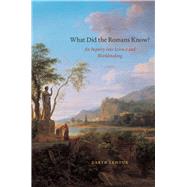
Note: Supplemental materials are not guaranteed with Rental or Used book purchases.
Purchase Benefits
What is included with this book?
| Acknowledgments | p. xi |
| The Web of Knowledge | p. 1 |
| A Roman World | p. 4 |
| A Roman World | p. 8 |
| Knowing Nature in the Roman Context | p. 10 |
| Overview | p. 17 |
| Nature, Gods, and Governance | p. 21 |
| Divinity and Divination | p. 22 |
| Roman Virtues | p. 25 |
| Nature and the Legitimation of the Republic | p. 30 |
| A Ciceronian Contradiction? | p. 34 |
| Knowledge of Nature and Virtuous Action | p. 37 |
| Fabulae versus Learned Observation | p. 42 |
| Conclusion | p. 45 |
| Law in Nature, Nature in Law | p. 47 |
| Laws of Nature | p. 49 |
| Natural Laws | p. 57 |
| Human and Divine Governance | p. 59 |
| Is a "Law of Nature" Even Possible in Antiquity? | p. 61 |
| Divinity, Redux | p. 72 |
| Conclusion | p. 74 |
| Epistemology and Judicial Rhetoric | p. 77 |
| Theory-Ladenness and Observation | p. 79 |
| Observations as Models | p. 83 |
| Observational Selectivity | p. 90 |
| Examination of Witnesses | p. 93 |
| The Natural Authority of Morals | p. 98 |
| Declamation and Certainty | p. 102 |
| The Embeddedness of Seeing | p. 106 |
| Doubts about Vision | p. 107 |
| Mechanisms of Seeing in Antiquity | p. 111 |
| The Eyes as Organs | p. 116 |
| Not Every Black Box Is a Camera Obscura | p. 121 |
| Epistemologies of Seeing | p. 125 |
| The Centrality of Experience | p. 129 |
| The Trouble with Taxa | p. 133 |
| Knowledge Claims and Context-Dependence | p. 136 |
| Unproblematic Facticity | p. 140 |
| Problems with Experience | p. 142 |
| The Lab Section of the Chapter | p. 147 |
| The Question of Worlds | p. 149 |
| Epilogue | p. 151 |
| The Long Reach of Ontology | p. 155 |
| Four Kinds of Justification for Prediction | p. 159 |
| Predictability and Determinism | p. 167 |
| Physical Solutions to Determinism | p. 169 |
| The Cascading Effect | p. 174 |
| Dreams of a Final Theory | p. 176 |
| Explaining the Cosmos | p. 176 |
| Orbs, Souls, Laws | p. 181 |
| Numbers in Nature | p. 188 |
| Harmony and Empiricism | p. 193 |
| Conclusion | p. 198 |
| . Of Miracles and Mistaken Theories | p. 200 |
| History as a Problem for Realism | p. 204 |
| Quantum Magnum PI? | p. 206 |
| Can We Avoid the Problems History Poses? | p. 209 |
| First Strategy: We Have Something They Didn't | p. 209 |
| Second Strategy: The Curate's Egg | p. 218 |
| Other Ways Out | p. 220 |
| Worlds Given, Worlds Made | p. 224 |
| What's in a World? | p. 224 |
| Kuhn's World | p. 226 |
| What Good Is Relativism? | p. 229 |
| Coherence | p. 233 |
| Truth and Meaning | p. 236 |
| Realism, Coherence, and History | p. 238 |
| Conclusion | p. 243 |
| Appendix: Lemma to the Mirror Problem | p. 247 |
| Reference List | p. 251 |
| Index | p. 269 |
| Table of Contents provided by Ingram. All Rights Reserved. |
The New copy of this book will include any supplemental materials advertised. Please check the title of the book to determine if it should include any access cards, study guides, lab manuals, CDs, etc.
The Used, Rental and eBook copies of this book are not guaranteed to include any supplemental materials. Typically, only the book itself is included. This is true even if the title states it includes any access cards, study guides, lab manuals, CDs, etc.